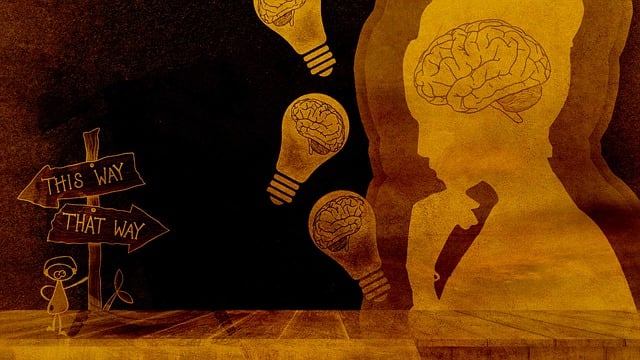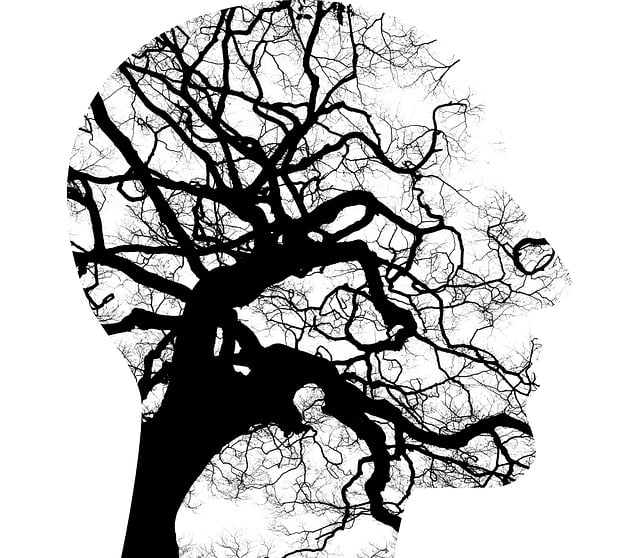In Arvada, Colorado, media portrayal of mental health significantly shapes societal perceptions, especially during major life transitions. Current depictions often reinforce stereotypes, but advocates are working towards a more nuanced approach. The community promotes balanced narratives and initiatives like Mental Health Policy Analysis to challenge typical depictions, encouraging Mind Over Matter principles for Anxiety Relief and reducing stigma. Arvada Major Life Transitions Therapy offers a unique, holistic strategy focusing on understanding and navigating life changes, providing tailored interventions for resilience and positive self-perception. Community outreach programs with diverse perspectives are crucial to bridge gaps in understanding mental health during significant life shifts. Positive media representation normalizes conversations, reduces stigma, and fosters empathy, contributing to a more supportive societal environment for those struggling with mental illness, as measured through public perception surveys and improvements in mental health outcomes.
In today’s digital age, media representation of mental illness plays a pivotal role in shaping public perception. This article delves into the current state and impact of mental health portrayal in media, exploring both its challenges and potential solutions. We present innovative approaches like Arvada Major Life Transitions Therapy, offering unique perspectives to combat stigma. By examining strategies for enhancing accuracy and sensitivity, we aim to guide media in responsibly addressing mental health issues. Ultimately, this piece emphasizes the importance of positive representation, measured through effective evaluation methods.
- Understanding Mental Illness Representation in Media: Current State and Impact
- Arvada Major Life Transitions Therapy: A Unique Approach to Addressing Stigma
- Challenges and Barriers in Accurate Mental Health Portrayal
- Strategies for Improving Media Accuracy and Sensitivity
- Measuring Success: Evaluating the Effectiveness of Positive Media Representation
Understanding Mental Illness Representation in Media: Current State and Impact

The media plays a significant role in shaping societal perceptions of mental illness, making accurate representation crucial. Currently, the portrayal of mental health issues in popular culture often falls short, leading to stereotypes and misconceptions. This is particularly evident during major life transitions, such as adolescence or midlife crises, where characters might be depicted as either overly dramatic or completely irrational.
In Arvada, Colorado, for instance, a city known for its diverse communities, mental health advocates are working towards a more nuanced media landscape. By promoting balanced narratives and raising awareness through initiatives like Mental Health Policy Analysis and Advocacy, the community aims to challenge typical portrayals. Encouraging the use of Mind Over Matter principles can also help in presenting individuals with mental illnesses as capable of managing their conditions and leading fulfilling lives, thereby fostering Anxiety Relief and reducing stigma.
Arvada Major Life Transitions Therapy: A Unique Approach to Addressing Stigma

In addressing the pervasive stigma surrounding mental illness, Arvada Major Life Transitions Therapy offers a unique and innovative approach. This therapy centers on understanding and navigating major life transitions, a strategy that proves effective in managing mental wellness and boosting self-esteem. By focusing on pivotal moments such as career shifts, significant relationships, or personal milestones, this therapeutic method empowers individuals to confront and overcome challenges associated with mental health issues.
Arvada’s approach recognizes the intricate link between life transitions and mood management. Through tailored interventions, patients gain valuable tools for adapting to change, building resilience, and fostering positive self-perception. This holistic strategy not only aids in recovering from mental illness but also equips individuals with lasting coping mechanisms, enabling them to thrive during life’s inevitable shifts and disruptions.
Challenges and Barriers in Accurate Mental Health Portrayal

The media’s portrayal of mental health issues often falls short, presenting a host of challenges and barriers when aiming for accurate representation. One significant hurdle is the tendency to perpetuate stereotypes and oversimplify complex conditions, leading to misinformed public perceptions. Many media outlets still depict mental illness as solely dramatic or extreme, ignoring the subtle nuances and diverse experiences associated with various psychiatric disorders. This approach can be detrimental, especially for individuals navigating Arvada’s major life transitions through therapy, as it may discourage them from seeking support due to fear of stigma or misunderstanding.
Furthermore, the lack of diversity in media representation contributes to an inaccurate narrative, as mental health struggles are not uniform across different demographics. Unique cultural and societal factors influence coping skills development and access to resources, which are often overlooked in mainstream media. Implementing community outreach programs that incorporate these diverse perspectives can help bridge this gap. By showcasing realistic portrayals, the media can play a pivotal role in fostering empathy, encouraging self-esteem improvement, and promoting understanding of mental health journeys, ultimately challenging societal barriers and supporting those in need of therapy during life’s transitions.
Strategies for Improving Media Accuracy and Sensitivity

Media has a significant impact on shaping societal perceptions about mental health, making accurate and sensitive representation crucial. To improve media accuracy and sensitivity, several strategies can be implemented. Firstly, involving individuals with lived experiences—be it through consulting or direct participation in production—ensures stories are authentically told. This approach fosters empathy building strategies by allowing audiences to connect with personal narratives, promoting understanding, and reducing stigma. Secondly, collaborating with mental health professionals ensures the portrayal of disorders is factually correct, helping to dispel myths and misconceptions prevalent in media.
Furthermore, focusing on resilience building and confidence boosting through positive representations can shift public perception towards individuals with mental illness. By showcasing recovery stories and emphasizing coping mechanisms, media can contribute to a more supportive societal environment. These strategies collectively work towards creating a more nuanced and accurate depiction of mental illness, especially during significant life transitions like those requiring therapy in Arvada.
Measuring Success: Evaluating the Effectiveness of Positive Media Representation

Measuring success when it comes to positive media representation of mental illness is a crucial aspect of driving meaningful change. It’s not enough to simply showcase characters with diagnoses; effective representation should aim to normalize conversations around mental health, reduce stigma, and promote understanding. One way to evaluate this is by gauging public perception shifts before and after exposure to such content. This could involve conducting surveys or tracking social media conversations to see if attitudes towards individuals with mental illnesses become more compassionate and empathetic.
Additionally, the impact on coping skills development cannot be overlooked. Media platforms, like Arvada Major Life Transitions Therapy programs, that offer resources for mood management and mental wellness can measure success by tracking participant engagement and improvement in mental health outcomes. Mental Wellness Podcast Series Production, for instance, could analyze listenership growth and user feedback to ascertain the reach and effectiveness of their content in normalizing conversations about mental illness and encouraging help-seeking behaviors.
Media representation of mental illness plays a pivotal role in shaping public perception. By implementing strategies that promote accurate and sensitive portrayal, we can significantly reduce stigma. The unique approach of Arvada Major Life Transitions Therapy offers hope by normalizing conversations around mental health. As we continue to navigate this landscape, measuring the success of positive media representation through evaluation is crucial for fostering an inclusive and supportive society. Let’s embrace these changes, ensuring that media becomes a powerful tool in challenging stereotypes and embracing diverse narratives surrounding mental illness.














